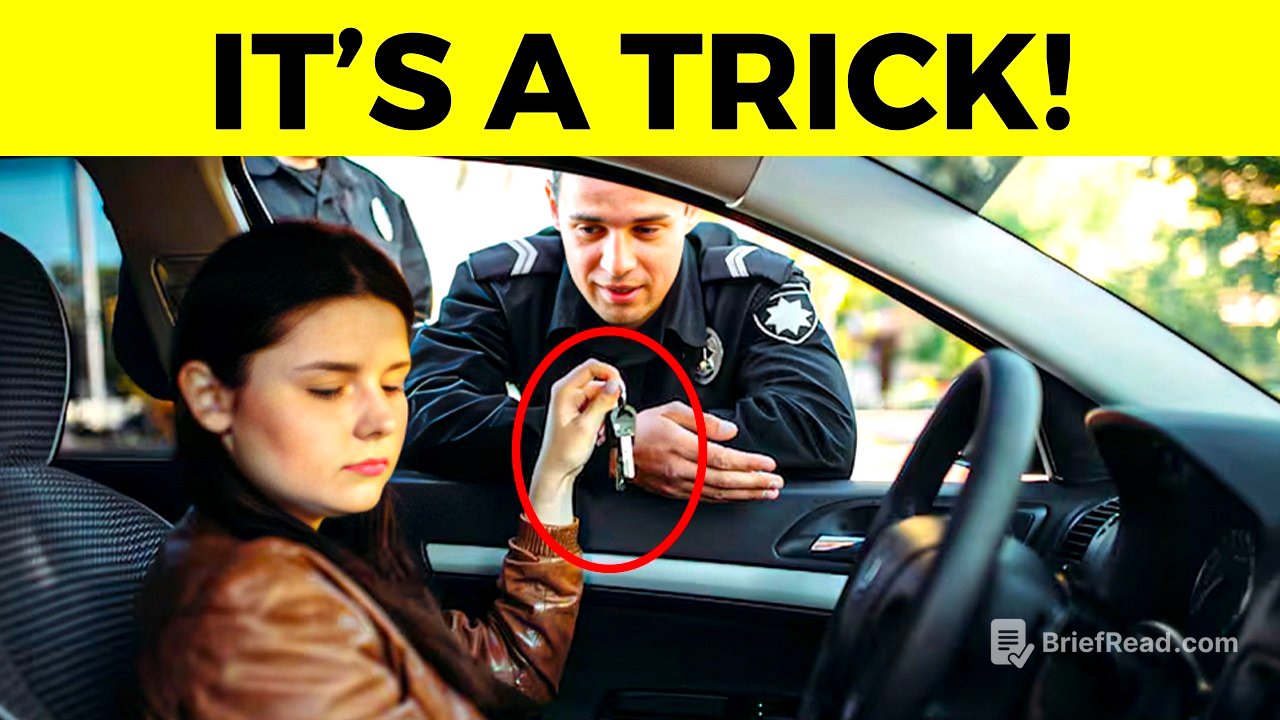TLDR;
This video reveals 25 tactics that police might use, covering scenarios from traffic stops to interrogations. It emphasizes the importance of knowing your rights, staying calm, and being aware of the various psychological and legal strategies officers may employ to gather information or secure a confession. Key points include the legality of police deception, the right to refuse searches, and the dangers of voluntary encounters and informal chats.
- Police can legally lie to you during interrogations.
- You have the right to refuse a search without a warrant.
- Remaining silent and requesting a lawyer are crucial when questioned.
Don’t Take the Bait [0:25]
When a police officer asks, "Do you know why I stopped you?", it's a tactic to elicit a confession. Instead of guessing or admitting to a potential infraction, the best response is a polite "No, officer." This prevents you from providing them with incriminating information they can use against you.
You Can Refuse a Search [1:16]
Police officers may ask to search your car, but you have the right to refuse if they don't have a warrant or probable cause. The Supreme Court ruled that police don't have to inform you of your right to refuse a search. If you consent, anything they find can be used against you. Therefore, it's important to politely decline the search and assert your rights.
The Fake Urgency Trick [1:59]
Police officers may try to create a false sense of urgency or authority by giving commands like "I need you to pop the trunk" or threatening to obtain a warrant. If they had sufficient evidence, they wouldn't need your permission. Don't be intimidated; assert your right to refuse.
The Voluntary Encounter Trap [2:38]
If a police officer approaches you on the street and starts a conversation, you're not obligated to stay unless you're being detained or arrested. Officers often don't inform you of your right to leave. To clarify your status, politely ask, "Am I being detained?" If the answer is no, you can walk away, exercising your rights.
The “Knock and Talk” [3:18]
Police may come to your home without a warrant for a "knock and talk," acting as though you must open the door and let them in. You have the right to refuse entry without a warrant or emergency. You can speak through the door or step outside, but do not invite them in, as anything they see or smell in plain view can be used against you.
Arresting for Minor Offenses to Enable a Search [4:03]
Police officers might arrest you for a minor offense, such as a broken tail light or a missing insurance card, as a pretext to search you or your car. The Supreme Court has upheld this practice. If arrested, do not resist, remain calm, say as little as possible, and seek legal counsel.
Claiming to Smell Contraband [4:54]
An officer might claim to smell contraband, like weed, to justify searching your car without your consent. In many jurisdictions, this is considered probable cause. If this happens, remain calm, politely maintain your position, and record the encounter to build a case for later.
Lying About the Law [5:33]
Police officers may misrepresent the law, such as claiming it's illegal to film them or that remaining silent constitutes obstruction. You have the right to record public officials and to remain silent. If an officer makes such threats, stay calm, ask if you're free to go, and don't hand over anything you're not legally obligated to.
Just Come Down to the Station [6:10]
If an officer invites you to the station to "clear things up," be cautious. You're not under arrest, but the environment can be coercive. You may not be read your Miranda rights, and people often talk themselves into trouble. Ask if you're a suspect and if you can bring a lawyer.
“Off the Record” and Informal Chats [6:51]
Officers may try to engage in informal chats without reading you your Miranda rights, but anything you say can still be used against you. If it feels like an interrogation, treat it as such. Stay calm, polite, and don't answer serious questions without a lawyer.
“You Don’t Need a Lawyer Now” [7:30]
If you hint at wanting a lawyer, officers may discourage you by saying it will slow things down or that they can't help you if you lawyer up. This is a tactic to keep you talking. Clearly state, "I want a lawyer" to legally halt the questioning.
The Reid Technique [8:10]
The Reid Technique involves wearing you down with isolation, pressuring you with accusations, and then offering a way out through a friendly officer. This method aims to get a confession but can lead to false confessions. Be aware if the mood suddenly shifts from hostile to helpful.
Marathon Interrogations and Sleep Deprivation [8:52]
Prolonged interrogations can last for many hours, leading to exhaustion and impaired judgment. Exhaustion increases the likelihood of saying anything to end the interrogation. You have the right to end the interrogation by stating, "I'm exercising my right to remain silent. I want a lawyer."
Help Yourself by Confessing [9:37]
Officers may suggest that confessing will help you, with promises of leniency from the judge. However, police officers cannot guarantee anything; only prosecutors and courts make those decisions. Confessing gives them what they need to charge you.
Lying About Evidence or Statements [10:08]
Police are legally allowed to lie to suspects during interrogations. They might claim they found your fingerprints, that a friend gave you up, or that there's video evidence, even if it's untrue. Don't panic; remember it's not your job to prove them wrong, but to protect yourself.
Lying About Eye-Witnesses [10:58]
Police officers might falsely claim that someone picked you out of a lineup or saw you at the scene. It's legal for them to fabricate this. Don't let a fake story pressure you into a real confession.
Your Friend Confessed [11:40]
Police may lie and say your friend has already confessed to get you to talk. This tactic aims to create worry about loyalty and encourage you to save yourself.
The Love To Use Leading or Loaded Questions [12:17]
Police may use leading or loaded questions to steer you toward a certain answer or make assumptions. If a question feels strange or unfair, slow down, think carefully, or remain silent.
The Hidden Police Agent [12:55]
Undercover officers or informants may be placed near you in jail, on the street, or at work. Anything you say to them is passed back to the police and is legal. Don't discuss anything with anyone you don't absolutely trust.
The Betrayal Trap [13:39]
Police might offer a deal to someone in your circle in exchange for information about you. This could involve wearing a wire or reporting what you say. Be cautious if someone you know becomes overly curious about your business.
Social Media Surveillance [14:23]
Police monitor social media, watching public posts, joining private groups, and using fake profiles to gather evidence. Be cautious about what you post online.
Undercover Sting Operations [15:05]
Police pose as drug buyers, sex workers, or shady dealers to see who takes the bait. While stings are legal, entrapment—tricking someone into committing a crime they wouldn't normally commit—is not. If a stranger is too eager to get you to break the law, walk away.
The “Mr. Big” Sting [15:48]
In a "Mr. Big" sting, police build a fake criminal empire around you, recruiting you for fake jobs and paying you real money. Eventually, you meet "Mr. Big," who requires you to confess to serious crimes before being fully trusted. These confessions are treated with skepticism due to their potential for coercion.
Getting Witnesses Talking [16:38]
Police use cognitive interviewing techniques to help witnesses remember details without pushing too hard. This involves asking about random details or having them recall events backwards to loosen up their memory.
Kinesic Interviews [17:19]
During kinesic interviews, officers watch your body language for signs of deception. They look for twitches, glances, fidgets, and other non-verbal cues that they may interpret as confession behaviors.









